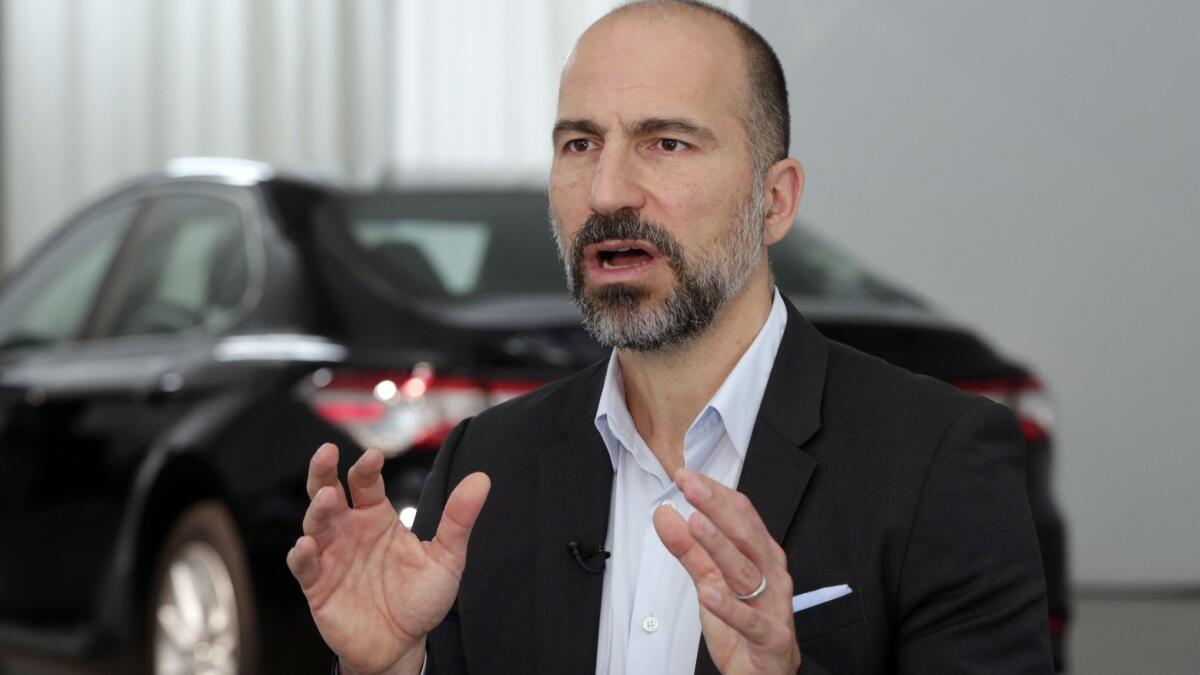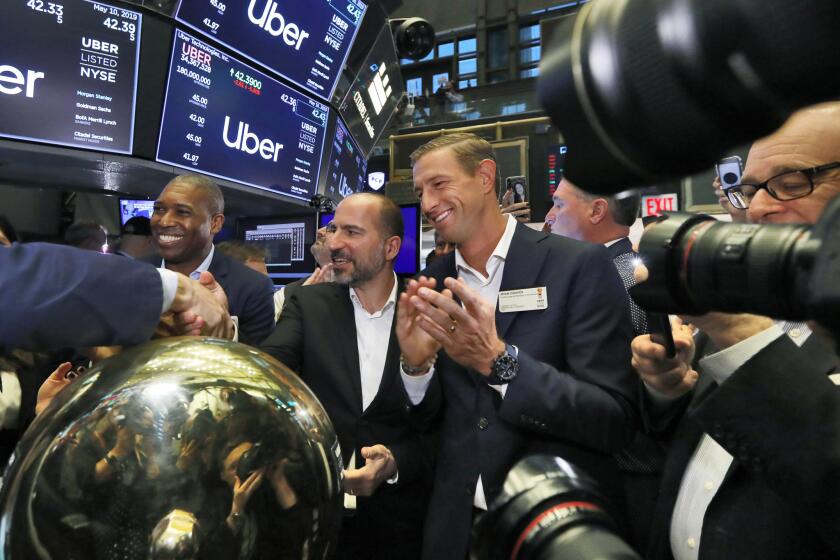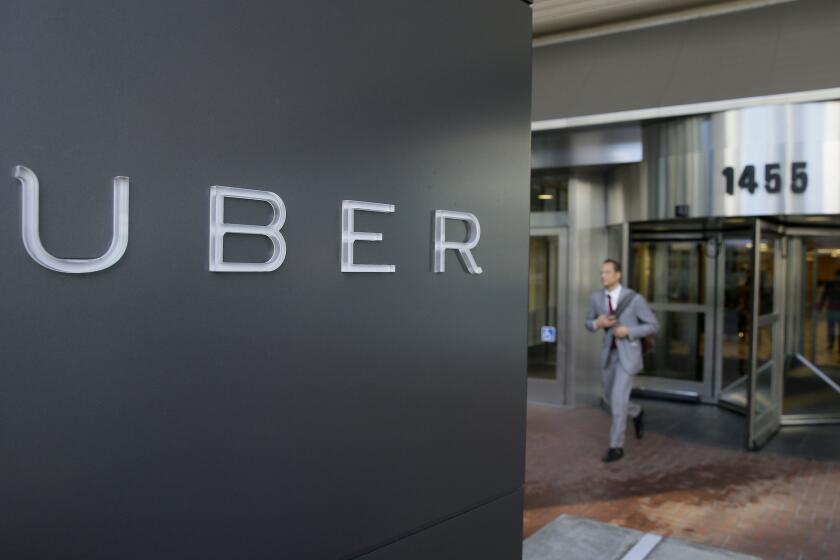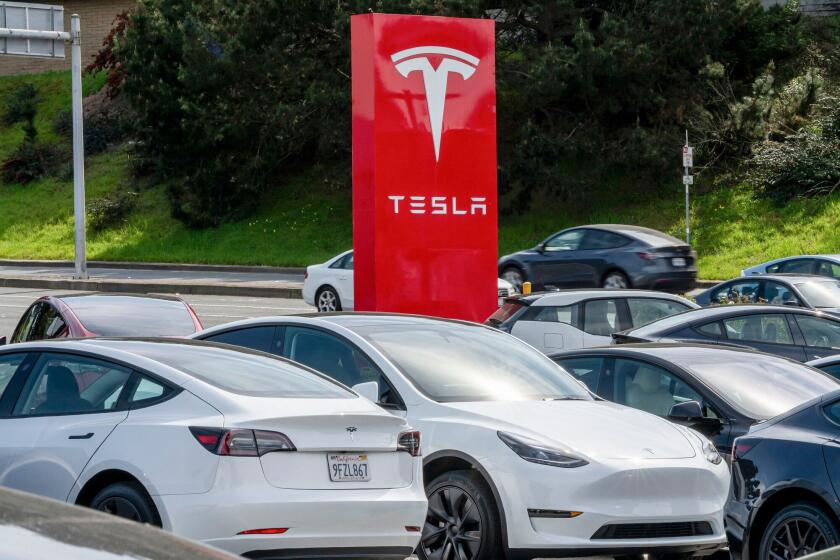After denying their drivers employee status, Uber and Lyft call them ‘essential’

- Share via
The role that drivers play in the success of Uber and Lyft has always been an issue that the ride-hailing companies have danced around.
Sometimes the firms have even denied that the drivers are very important at all.
Last year, for instance, Uber asserted that the drivers’ work was “outside the usual course of Uber’s business, which is serving as a technology platform for several different types of digital marketplaces.”
Rideshare drivers and food delivery people...should, as frontline workers, receive prioritized access to the vaccine in Phase 1b.
— Uber CEO Dara Khosrowshahi
The companies, moreover, were behind the successful campaign this year for Proposition 22, which barred their drivers from being designated “employees” under California law.
That denies the drivers unemployment benefits and workers’ compensation, bars them from organizing a union and exempts the firms from wage and hour laws.
Yet lately the companies have been demanding that their drivers be classified as “essential workers.”
Doesn’t that sound more than a teensy bit hypocritical?
What’s driving the companies’ change of heart? In a nutshell, COVID-19. More precisely, the rollout of COVID-19 vaccines, which started in recent days.
Both companies have asked governors and other policymakers to give their drivers vaccine priority. That’s important in the near term, while the first vaccines are in very short supply and access to them is a zero-sum game — for every essential worker who receives a shot, another of putatively lower priority will have to wait.
“Ride-share drivers and food delivery people, including the 190,733 in California who have earned money on the Uber platform during the pandemic, should, as frontline workers, receive prioritized access to the vaccine in Phase 1b,” Uber CEO Dara Khosrowshahi wrote in a letter to California Gov. Gavin Newsom.
Proposition 22 is a revolutionary step in the influence of tech-based businesses in our daily lives in general and the lives of workers in particular.
The letter, which is similar to those the company wrote to the governors of all 50 states, cites a plan developed by the Centers for Disease Control and Prevention.
According to the CDC plan, Phase 1b would give “essential workers” vaccine priority second only to 21 million healthcare workers and place them on the same priority level as adults with high-risk conditions and those over 65.
Those top four categories would comprise about 260 million Americans, leaving about 70 million still waiting in line. Unsurprisingly, therefore, numerous industries have started lobbying for “essential” classification.
As my colleague Hugo Martín reported recently, policymakers have heard from “labor and professional organizations for pilots, flight attendants, teachers, bus drivers, meat industry workers and bank tellers, among other groups.” In California, there’s a move on to add journalists to the roster.
Let’s be clear: No one should argue that ride-hailing drivers shouldn’t be given essential worker priority.
Indeed, the CDC lists transportation in its non-healthcare roster of essential occupations, along with jobs in food and agriculture, policing and firefighting, and manufacturing, information technology and communications, among a few others.
Uber and Lyft make the point that their drivers have shouldered considerable responsibilities during the pandemic — Lyft praises them for “transporting patients who need regular rides to and from medical appointments, providing healthcare, public safety and other first responders with rides to work, and delivering essential goods, including meals for home-bound seniors and school lunches for low-income families.”
What makes the companies’ position hypocritical isn’t that they’re calling their drivers “essential” today, but that they’ve dismissed them as nonessential in the past.
The Proposition 22 ballot campaign by Uber and Lyft just became the most expensive such campaign ever.
Uber’s assertion that driving is “outside the usual course of its business” came during the legislative battle over AB 5, the law that ultimately required drivers and other gig workers to be given employee status. The comment was made during a news conference by Tony West, Uber’s chief legal officer (and brother-in-law of Vice President-elect Kamala Harris).
In August, after a state judge rejected their claims to be exempt from AB 5 and ordered them to classify their drivers as employees forthwith, Uber and Lyft threatened to pull out of California. So much for their drivers being “essential” during the pandemic.
The judge, Ethan Schulman, called the companies out for denigrating the importance of the drivers to their business model. Their position was “nonsense,” he said. “To state the obvious, drivers are central, not tangential, to Uber and Lyft’s entire ride-hailing business.”
Schulman’s order was held in abeyance during the campaign to pass Proposition 22, which permanently exempted the companies from AB 5. Uber and Lyft spent more than $120 million between them to pass this obnoxious ballot measure; gig companies DoorDash and Instacart fattened up the war chest with an additional $83 million. The $205 million spent on Proposition 22 made it the costliest ballot initiative campaign in American history.
By the way, how much should you trust anything these companies say? They got California voters to pass Proposition 22 in part by warning that if they had to give their drivers employee benefits, fares would go up. Now that they’ve won and drivers won’t receive employee benefits, Uber and DoorDash are ... raising fares! It’s a safe bet that Lyft will soon follow.
Proposition 22 speaks to the notion that drivers’ welfare is of secondary importance to Uber, Lyft and the other gig companies.
Uber’s threat to leave California is just a bully’s move. The state should call its bluff.
It denies drivers basic workplace protections, substituting a sheaf of benefits that don’t come close to making up for what the drivers lose. It includes a health insurance benefit that the vast majority of drivers won’t qualify for, and a minimum wage that will be largely consumed by the drivers’ responsibility to pay for their own gas, insurance and vehicle maintenance.
Drivers would benefit from moving closer to the front of the line for vaccinations, of course. The companies, however, would be major beneficiaries of essential worker designation for the drivers. It would help keep more of them on the road, for one thing. Customers’ nerves would be eased, knowing that drivers were inoculated, and therefore might feel more comfortable hailing a ride.
But let’s not buy the companies’ pretense that they have only the interest of the drivers and the public at heart.
“Together, I hope we can use our technology to accelerate the end of this public health crisis and the beginning of the economic recovery to come,” Khosrowshahi wrote to Newsom.
Honeyed words; too bad he wasn’t talking that way when his company was saying the drivers didn’t matter and was threatening to leave California flat.
More to Read
Inside the business of entertainment
The Wide Shot brings you news, analysis and insights on everything from streaming wars to production — and what it all means for the future.
You may occasionally receive promotional content from the Los Angeles Times.














